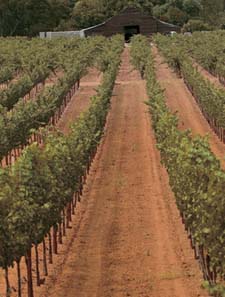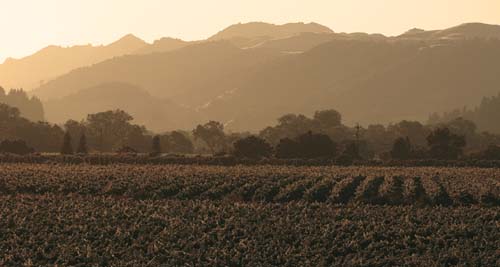 |
 |
| current issue |  |
past issues |  |
send a letter/news |  |
address update |  |
advertise |  |
about us |  |
alumni home |
Features
Grape ArdorPage 2 of 4
Peter Paul enjoys a joke that's older than the bottles in his wine cellar: "How do you make a small fortune in the wine business? Start with a large fortune." Luckily, he did. Headlands Mortgage, the company Paul started in 1986, became one of the nation's top wholesale lenders by specializing in a particular kind of loan. Technically, it's called Alternative A, but Paul spares non-MBA's the details; instead, he spins analogies using sports or food.
When Paul sold Headlands in 1998, the $475 million deal was the largest business transaction in Marin County history. The agreement required him to stay out of the mortgage business for five years, which meant he watched from the sidelines during the hottest part of the real estate boom. It was frustrating—"like retiring just before your team goes to the Super Bowl"—but he kept busy. He worked with the Headlands Foundation, a nonprofit he'd started in 1996 to support local social service groups. He became a major sponsor of the Russian National Orchestra. He built houses with partners. He gave $10 million to UNH. He backed friends' restaurants. He bought a house in Costa Rica. He bought Grove Street Winery.

|
Making wine may seem completely different from making loans, but to Paul they fit a single quest: making money while having fun. He gets as excited talking about mortgages as talking about merlot; his face lights up as if he's just discovered the fun in funds. Judy Miller, who has worked with him for 20 years, says Paul can expound on a zillion subjects. "You're driving along and you make a stray remark like wondering how deep the bay is," she says, "and 10 minutes later he's still talking about it and he knows."
What he knew about wine might have stopped him from buying Grove Street. "It's a haw-rible business," he booms cheerfully from his desk at Paul Financial, the mortgage company that gives away a bottle of wine with every loan. (Even after 30 years in California, Paul retains a Yankee accent that turns shortly into shawtly.) "You have four or five years of inventory. It takes you so long to get a product out, and then you have only one try to do it." In other words, Grove Street buys grapes but can't know for years what they'll turn into. Meanwhile, markets fluctuate and tastes change. In an optimistic moment, Paul says wines are like restaurants: People have favorites, but they'll still try others. In a pessimistic moment, he says wine stores are like bookstores: If you're not a "name" author, you don't get a prominent place. The name authors of the wine world get rave reviews in Wine Spectator. Though Grove Street wines have won numerous gold medals in competitions, they've yet to become the hot brand.
Together, Sonoma County wineries sell $2 billion in wine each year. But only someone who overindulges in the grape would expect big money from a small winery. Gulyash says the business is a constant struggle to balance quality with demand, and demand can change in an instant. In 1991, a "60 Minutes" segment on the health benefits of red wine caused a huge upswing in sales. In 2004, the movie "Sideways "had a similar impact on sales of California pinot noir. The good news was that Grove Street had a good pinot. The bad news is that it sold out—and when it's gone, it's gone. That particular wine can never be created again.

|
Musing on the ephemeral nature of pinot is ordinary dinner-table conversation in northern California. "It's a wine society," Paul says. "Everything here connects to wine." Wine is the basis for tourism, the measure of trends, the source of obsession with the weather. Wine is history: Some of the vines along the Russian River have been producing grapes since the 1880s. Wine is news: When California wines beat French wines in a European tasting competition, the victory rates a front-page story in the San Francisco Chronicle. Wine is community currency: Northern California nonprofits rely on wine auctions, fundraising events at which wineries put luxurious dinners and vacations and cases of wine up for bid. Local business people attend and donate to one another's wine auctions in a huge circle that fills both social calendars and charity coffers.
Page: < Prev 1 2 3 4 Next >Easy to print version

